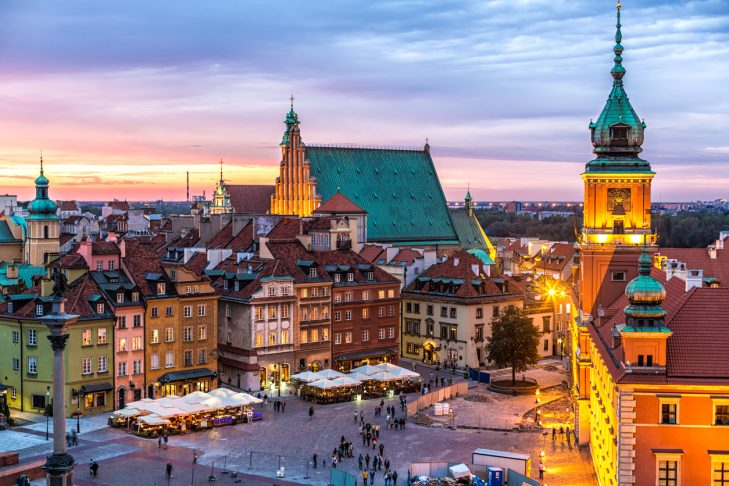It may come as no surprise that there is a genealogist on staff at the Jewish Community Centre of Krakow. According to Jonathan Ornstein, executive director of the JCC, the latest Jewish renaissance in Poland includes Poles discovering their Jewish roots for the first time in their lives. Ornstein, who was on a speaking tour of Boston last week, told an audience at The Vilna Shul the story of a young woman whose grandmother admitted to her that their family was Jewish. “You’re Jewish,” her grandmother implored. “Go find out what that means.” The young woman began her Jewish journey in Ornstein’s office.
The anecdote served as a backdrop to the subject of his talk—Poland’s “Amended Act on the Institute of National Remembrance,” also informally known as the “Polish Holocaust Bill.” Before he addressed the details of the bill, Ornstein summarized the current state of Polish Jewry. “You can’t look at this bill in a vacuum,” he said. “Something miraculous is going on in Poland. The idea that people are finding out they are Jewish and getting involved is real. Poland, after all, was a very Jewish place for a long time. At one time, 75 percent of the world’s Jews lived there.”
By the time the Nazis occupied Poland in September 1939, Jews made up 10 percent of Poland’s population, and Warsaw and Krakow were a third Jewish. There were 30 daily newspapers published in Yiddish. But in the end, 90 percent of Polish Jewry was exterminated in the Holocaust. After 1945, some Jews stayed in Poland but life for them was not easy under communism. In 1968 they had to make a choice: continue to be Jewish somewhere or stay in their home country and go underground.
“In 1989,” asserted Ornstein, “the country woke up from a long bad dream. The last time the country was free was in 1939. Poland had been frozen in time for 50 years.” Ornstein’s narrative acknowledged that prior to 1939, Polish Jewry experienced ups and downs in its thousand-year history. However, in 1989, non-Jews in Poland became very interested in all things Jewish. The Jewish Culture Festival in Krakow was founded by two non-Jews, and today it’s the largest Jewish cultural festival in the world. In 1993 Steven Spielberg filmed “Schindler’s List” in Krakow’s Jewish quarter.
In 2002 Prince Charles was in Krakow on a state visit and was intrigued by the Jewish quarter. He listened to Holocaust survivors and survivors of communism when they told him they wanted a senior center. In partnership with World Jewish Relief in the UK, the Prince of Wales opened the JCC in Krakow in April 2008. A decade later, the center has over 700 Jewish members. The center also houses the first Jewish kindergarten in the country since the World War II, along with a thriving Hillel. In 2017, the center received 125,000 visitors.
“When the JCC opened it became integrated with the outside community,” Ornstein observed. “That’s the miracle I was talking about earlier. Here we have the rebirth of Jewish life an hour’s drive from Auschwitz. This is one of the most amazing stories of rebirth in the Jewish world today. It would be a shame to let something like this [Holocaust Bill] get in the way of that.”
The bill is an amendment to a 1998 law that criminalized the denial of German and Soviet crimes during the Holocaust and the subsequent Soviet invasion. It takes the law a step further and imposes fines or up to three years in prison for those who attribute the Holocaust to “the Polish Nation or the Republic of Poland.” As published in The New York Times, the amendment says:
“Whoever claims, publicly and contrary to the facts that the Polish Nation or the Republic of Poland is responsible or co-responsible for Nazi crimes committed by the Third Reich or for other felonies that constitute crimes against peace, crimes against humanity or war crimes, or whoever otherwise grossly diminishes the responsibility of the true perpetrators of said crimes—shall be liable to a fine or imprisonment for up to three years.”
While the amendment aims to address public speech that inaccurately attributes Nazi crimes during the Holocaust to Poles, it has a tonal problem. The Washington Post reported that Jewish organizations such as AJC agree that crimes during the Holocaust were “committed by individuals rather than the Polish state and that the term ‘Polish death camps’ was unjust and untrue.” But the amendment is tantamount to banning free speech.
Yad Vashem issued a statement that “the term ‘Polish death camps’ is erroneous,” but education programs, rather “than this problematic piece of legislation,” corrects historical inaccuracies. The State Department weighed in on the amendment and said its passage could have consequences for “Poland’s interest and relationships.”
Those relationships include what Ornstein described as its “wonderful connection with Israel.” He cautioned that the amendment may be hurtful or even harmful to free speech, but it is not based on anti-Semitism. The amendment brings forward the Polish viewpoint that they too were victims of the Nazi genocide. According to the United States Holocaust Memorial Museum, the Germans murdered 3 million Polish Jews and an additional 1.9 million non-Jewish Poles. The Germans’ most notorious death camps, which include Auschwitz-Birkenau, were in Poland.
While the amendment passed in Poland’s Senate and its lower chamber, Ornstein said he’s optimistic about the future of Jewish Poland. This June the Jewish Cultural Festival is expected to draw thousands of visitors. “The Holocaust is not our entire history in Poland,” he said.



